#WakeUp, @FarmersJournal et al...
| This morning, I woke up to an article in the Farmer’s Journal touting the “beneficial effects” of the greenhouse gas, carbon dioxide (CO2), on crops as stated by a "scholar". This isn’t the first time I’ve heard that simplistic argument thrown around as an excuse to “burn, baby, burn” but what disturbs me about this article in particular is: |
 IFA Chairman, Harold Kingston, appearing with Cara Augustenborg and Fr. Tim Bartlett on Joe Duffy's Spirit Level (Oct. 2015)
IFA Chairman, Harold Kingston, appearing with Cara Augustenborg and Fr. Tim Bartlett on Joe Duffy's Spirit Level (Oct. 2015) Irish agriculture has progressed some way on the road to addressing climate change – Only a couple of weeks ago, I was pleasantly surprised when IFA chairman, Harold Kingston, joined me on RTE’s Spirit Level and explained how he personally was working to convince farmers to reduce their greenhouse gas emissions.
We’re finally making a bit of progress in climate action in Ireland, but with a stroke of the pen, a journalist can undo it all by telling farmer’s “This climate change business will be great for crop production”. If only it were that simple…
Are carbon dioxide emissions good for crop production?
The simple science
| 1. Carbon dioxide is not the only factor affecting plant growth. Any primary school student can tell you that plants take in carbon dioxide and that contributes to plant growth (photosynthesis), but plants (like animals) are complex organisms and it takes a lot more than just carbon dioxide to make them grow. Resources like nitrogen, phosphorus, and potassium, water and optimum temperatures are also important factors in plant growth. |
| 2. Rising atmospheric CO2 concentrations makes crops more vulnerable. As a result of increasing CO2 concentrations in the atmosphere, the other resources plants depend on can be negatively impacted. For example, temperature is affected by CO2 as our atmosphere “thickens” from continued greenhouse gas emissions and, like an insulating blanket, warms our planet. Temperature could rise to a point that some food crops can no longer survive – Crops thrive in a very narrow temperature window so even a shift of a few degrees could threaten their survival. |
| 3. Disruption to the world’s water cycle is a significant threat to crop production, outweighing any benefit of rising CO2 emissions. The Earth’s average temperature is predicted to rise 1.6ºC based on all the greenhouse gases we’ve already pumped into our atmosphere, having risen by 0.8ºC already since the Industrial Revolution. Many scientists believe any warming beyond 1.5ºC is dangerous, and current emission reduction commitments to the United Nations present a best case scenario of reaching 2.7ºC warming by 2100, well beyond safe limits. |
The moral imperative to end the confusion
| I’d rather be doing anything else than writing a blog to take down another stupid climate denier argument, but then I think about how little time we have left to take the big actions to prevent climate destabilisation and feel I have a moral obligation to address the things that compromise such action. I’d like to believe journalists are also aware of the critical time pressure we’re under with respect to climate action and that they would use their influential positions to help foster solutions. |
While I’m ranting, can I also ask journalists to please look at the qualifications of your “experts” and "scholars" before you claim everything they say as gospel? Speaking as someone with a doctorate, I can assure you that an extra 4-6 years in university does not make us experts on everything. We all have our niche, which is usually so small that it’s relatively useless in the grand scheme of things – In my case, I did my doctoral research at Teagasc on nutrient uptake in grassland so I have some understanding of plant physiology, though there are several Irish scientists with a far greater understanding who I would happily refer any journalist onto for a definitive view on this subject. Next time you interview a professor/doctor of anything, I urge you to have a look at what their Ph.D. is actually in. If you’re quoting an electrical engineer, mathematician, physicist or even a meteorologist on how plants grow, you’re barking up the wrong tree.
Please - stop wasting time confusing the public for the sake of a controversial headline because there is simply no more time left to waste.
There are better stories to tell
| In small ways, segments of Irish agriculture are making progress in addressing greenhouse gas emissions – Farmers are exploring options to produce renewable electricity; many are aware of their carbon footprint and want to diversify into emissions offsetting schemes; and the unprofitability and volatility of emissions-intensive beef and dairy are causing some to rethink their investments in those sectors. |

#WakeUp
-Cara

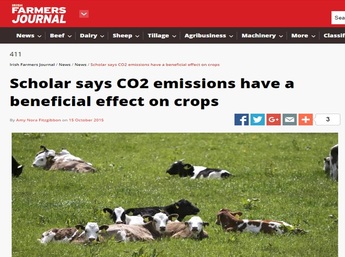
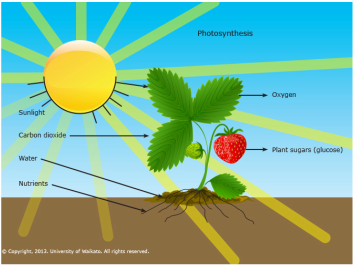
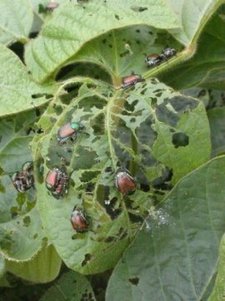
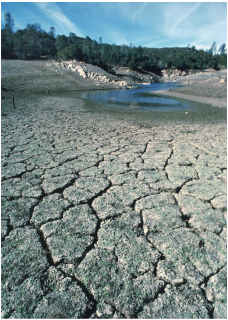

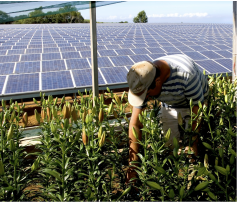
 RSS Feed
RSS Feed
